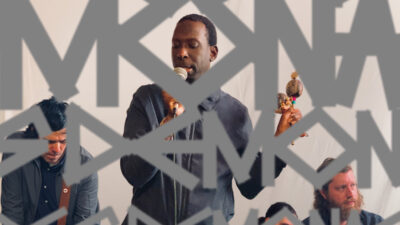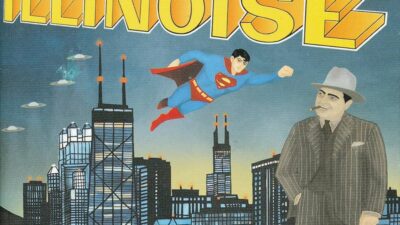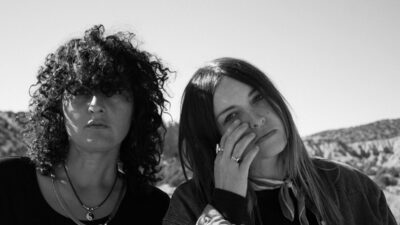Before I determine whether or not I want to travel somewhere, the first thing I do is look up what bands and labels are from that city. In high school, when I thought of Los Angeles, the first thing that came to mind was Brainfeeder. Artists like Flying Lotus, Samiyam, and Lapalux shaped my perception of a city that is as trippy as it is conventional, as laid back as it is chaotic. Moving to the greater L.A. sprawl as an 18-year-old in 2016, I was a bit too young to catch the beat scene’s heyday, but the musicians on FlyLo’s wonderfully curated roster soundtracked many a SoCal sunset as I adjusted to life on the West Coast. I spent my first weeks of college playing beat scene pioneers on my radio show, spending more money than I had in my bank account on Ubers to-and-from Brainfeeder At The Bowl, and stumbling into and out of a rotating selection of dorm rooms in various states of disorientation asking complete strangers if they’d heard COSMOGRAMMA. I had the pleasure of talking to Brainfeeder Label Manager Adam Stover about his experience working for the label just one day after Flying Lotus, Kamasi Washington, and Thundercat all received Grammy nominations. Needless to say, it was an absolute dream come true.
Congratulations on having two Brainfeeder artists get nominated for Grammys! I’m wondering what led up to that. Did you have to do anything on your end or was it kind of a surprise out of the blue to see FlyLo and Thundercat on that list?
Adam Stover: As a label, we have to submit our records in various categories. A couple other people I work with and I, we all submit those records and Thundercat’s record was lucky enough to get a nomination for Best Progressive R&B Album, and FlyLo being the sort of primary producer for that record also got a nomination for Producer of the Year (Non Classical), which was a great surprise. Obviously we feel he’s that good and he deserves it, but there’s a lot of categories we put in for that record, like, “Let’s give it a shot,” and we got it. That was a great feeling to see that happen. I know he’s super happy, super stoked to get that nomination.
I mean, it was a great feeling to see as a fan, so I gotta imagine that being the person behind the label it feels even cooler!
AS: Oh yeah! Definitely! He didn’t even know that we put him in the pool for nomination in that category, I don’t think. There were a lot of different categories and his name was in a bunch of them because he produced this record for Thundercat, but he didn’t know about that. That was a big one, and he’s alongside some really big producers. It’s, like, “Woah, okay!” We agree he’s at that level and he should be recognized, so it was a great feeling. I know he’s happy.
Yeah, I gotta imagine! That must be so cool.
AS: Yeah, we’re lucky.
Alright, so before we get too into modern Brainfeeder, I want to start from the beginning. I was reading about the label, and I read that you met Flying Lotus at Das Bauhaus, which was a housing complex and artist commune. I’m curious what brought you there, and I’m curious what you were doing creatively before you started Brainfeeder.
AS: I moved into that place probably around 2005. I lived there a few years before I met Steve (Ellison A.K.A Flying Lotus). The primary reason I was living there was because I was at school. Early on, I did junior college a few times and just screwed around. I took a lot of classes, but mainly electives and stuff. Whatever the case, I got serious about it and I moved to the Valley and I had a few friends who lived there. They were all artists, and basically rent was cheap. It was a lot of artists who lived in this place instead of your standard complex. People were making music, people were doing all sorts of visual art, so I went for it and I got into this place. I started working at Tower Records in Northridge, and I finished up Junior College at Pierce and I went to CSUN. I went to CSUN for around two years, and I was finishing that up right as I met Steve. I had just finished that up and Tower Records unfortunately went bankrupt, so that was coming to an end.
I basically was a student and I worked at Tower Records, and here came Steve. It’s funny because a friend of ours who got him into that apartment complex, his name is Anthony Valadez and he’s a DJ on KCRW, at the time he was just a straight DJ and he didn’t have a radio station. Whatever the case, he had met Steve through a mutual friend of ours Alfred, whose stage name is Daedelus, and Daedelus introduced him to Steve right when he was kicking off his musical career, having done the record 1983 on Plug Research. Next thing you know, this guy shows up.
Having worked at Tower Records I was familiar with Flying Lotus from the beginning. When he moved in I was, like, “Oh, dude, you’re Flying Lotus? That’s cool! I got your record,” and whatever. We started talking, and next thing you know we figured out that we had similar musical tastes and film and a lot of different things that we focused on, we had in common. We just became friends, and that’s how that kicked off a few years before Brainfeeder even started. That’s how I got there.
That is very cool! I honestly cannot imagine being in a context where I’m casually hanging out with Flying Lotus, so I’m a little jealous that you’ve had that experience.
AS: Yeah, well this is before he was as famous as he is now. He had one record out and was a local L.A. producer. But yeah, that’s how it all kinda kicked off at the very beginning.
So, I think I read that you worked at Tower Records and ran Brainfeeder in tandem. I’m curious what it was like balancing two music jobs. What were some challenges or obstacles you faced working at a larger music company and also helping to run a small, boutique indie label?
AS: I’ve always been a music lover. Working at a record store helped me to expand, explore a lot of genres, listen to a lot of stuff. We’d be able to get music for really cheap or we’d get promos, and I’d be listening to all kinds of stuff. But I was primarily into electronic music for quite a long time. It’s strange because I was listening to beat music back at that point in time, and I was into a lot of instrumental hip hop stuff like Madlib, J Dilla, Doom, Madvillain, and all that kind of thing. It was weird because Steve was an intern at Stones Throw for a little while before he did all of this. He had just ended that when he moved into Das Bauhaus. It’s weird, but I kind of knew the scene, basically. Another scene that I was really into was the IDM stuff from the U.K. and Warp and things like that.
So basically, shortly after I got to know Steve and we’d hang out and he’d show me some music he was working on, he was, like, “Yeah, I just signed with Warp.” He went away for a while, he played a couple gigs, and he came back and he was, like, “Yeah, I went to the U.K. I’ve got a manager now and I just signed with Warp.” I was, like, “Warp? Are you serious, dude? That’s amazing!” He started creating his first Warp record, LOS ANGELES. He did an EP before that, but whatever the case, this is early days where he was just becoming what he is now. I was doing my thing at Tower and I was going to school, but nothing else had solidified yet. Steve had a lot of friends in L.A. He had a lot of producer friends, and not only in L.A., but there was kind of this small scene of people that were part of this thing called Sketchbook with this guy Kutmah. It was also Take, Dibiase, and Ras G. Sort of the old Dublab crew. I don’t know how familiar you are with Dublab…
So, I currently live in L.A. and I moved there, like, five years ago. But I’m 22 so all of this feels very, like, mythical to me. It’s kind of the L.A. that drew me there, getting into those producers as a young person.
AS: Yeah, totally. I feel you. Those are friends, but I was a fan of the stuff too. I’m a bit older at this point, and that’s what I was super into. I was curious how familiar you are with some of these names that I’m throwing out there, but that was the early early days, was Steve and his friends. I got to know a lot of these guys, they’d come through to Steve’s. They’d just be playing beats all the time, and it was pretty amazing. A few of those people, probably one of the first I met, was Samiyam. Sam was living in Michigan and Steve was, like, “Yo, you should just come out here. Come out here and we’ll get into stuff.” Basically, we talked to the guy who owned Das Bauhaus, the landlord, and we were, like, “Do you have any other rooms?” He was, like, “Yeah, I have this other place.”
So next thing you know, Sam moves out here and we start hanging with Sam. They’re making beats together, they have this project called Flyamsam, and in those early early days some of Steve’s friends who I didn’t really know at that point kicked off a club called Low End Theory, and Low End Theory was Gaslamp Killer, DJ Nobody, Daddy Kev, this guy named EdIT who’s in The Glitch Mob. EdIT took off after a few years, and D-Styles took his spot, and there were a couple people who would guest DJ. In any case, that’s where we used to hang when everything first started off, and basically this group of producers, because they were so tight-knit, they were the first people that we released on Brainfeeder. The reason Brainfeeder was born is because this sort of independent instrumental music that they were doing… nobody really cared. We were kind of the outsiders where people were, like, “What is this crap?” There was, like, the Madlibs and the people who were really amazing producers. But these artists, nobody had really picked up on. It was just this underground thing going on.
Steve was signed to Warp, he was making his first record, and he was, like, “Shit, I gotta figure out a way to put my homies on. I gotta get people to take notice.” So he was, like, “Well, what if I just figure out a way to start a label and I can start to release everybody’s music and we can get that music out there and we can all tour and we can play shows together.” And boom, that was the beginning of Brainfeeder. Flying Lotus was basically just trying to create a platform for his friends to release their music. And there you are, the very first releases of Brainfeeder, that’s how that came about.
So at what point did Brainfeeder become your full-time job? Was there a moment where you realized the label was really going to become something?
AS: It’s funny because, like I said, Tower Records was going bankrupt. Therefore, I had a limited timeline to be able to continue to do that job, and then simultaneously Brainfeeder was kind of coming together, but in that moment all I was doing for Steve was trying to help him establish social media stuff. I created a MySpace page, like, we’re talking early social media. MySpace existed, Facebook had just started to exist.
I guess another facet of Brainfeeder that you should hear about a little bit is that MySpace was kind of, like, the core of where everybody was meeting each other beyond this small group of people that were in L.A. So that’s how other producers started to connect with Steve, and all of us, was everyone on MySpace, putting their beats up on their player. People would check them out and be, like, “Yo, this is good.” Next thing you know, people would connect, and that’s how a few more of the artists became part of Brainfeeder. We all found each other on MySpace.
Going back a little bit, I basically helped Steve start all of our social networks because as a label back at that point in time, you needed to have an outlet to promote your music. MySpace was one of them, but eventually Facebook popped up even though Facebook was pretty unviable for the first several years. It was just, like, boring basically and there was no music functionality to it. And then Twitter kicked in. Next thing you know, I was basically the social media manager for Brainfeeder.
Tower Records fizzled out, and simultaneously Steve was, like, “Look, I gotta finish my records, I gotta go on tour, I gotta do all this stuff and be this artist and keep my own career moving forward. But I need someone to help me maintain this label that I started.” I was, like, “Hey, I’m learning. I’ll be totally transparent with you, I’m just learning this, but I know what we’re doing. I can deal with the artists and make sure everything works properly with our distributors, all that kind of stuff.” He was, like, “Okay, we’ll give it a shot.” His manager, his name is Dom, a British fellow who has been in the music industry for a long time, showed me the ropes on a lot of stuff. I’ve learned a lot from him, and consider him one of my mentors.
I pretty much learned as I went, to be honest with you. As far as the music industry went, there was no going to school for this. What I went to school for had nothing to do with the music industry, really. I studied graphic design and now I use that a lot. I actually do a lot of album artwork for people. But at that point in time, it didn’t help me at all in learning the music industry. I just winged it for a long time until I started to understand more and more about it, really. So, yeah, that’s kind of how it kicked off. Tower Records ended and Brainfeeder began. I went from one step to the next, and we’re going into our 14th, I think, technically, year in existence. That was the transition. One door closed, another one opened.
That’s how it goes sometimes. As Label Manager, what are the differences between what you do with Brainfeeder and what Flying Lotus does with Brainfeeder?
AS: As Label Manager, at this point in time, I oversee everything. There’s aspects to the label that Steve handles on his own, and as he should. He has his own reputation, and he has a great ear, probably more than any of us do. So, for one, a lot of people come to Steve and they say, “Hey, check my stuff out.” People submit demos or people just hit him up one way or the other. The main thing that Steve does, beyond being the actual owner of this label, he’s basically the primary A&R of the label. He connects people and he brings people in and he makes a judgement call about who is on the label, essentially. There are instances where I’ll bring somebody in and I’ll be, like, “Hey, check this guy out. They’re really cool.” And he’ll be, like, “Yeah, great.” And we sign that artist, and our roster has grown and grown throughout the years. Whatever the case, he’s the head of A&R for lack of a better word, and most importantly, the founder and owner of Brainfeeder.
Just about everything else, I handle at this point in time. We have distributors, we have people that work in various capacities within our distribution. There’s no way I can do everything. It’s more of just an overall management of the situation. All the campaigns, I do all the negotiations for contracts with our lawyers, I deal with the artists and their management, I oversee the press, the radio. I weigh in on every sync that we do and negotiate. There’s a lot that I do at this point. Whatever the job is, I usually do it, but there’s a lot of moments where I’m, like, “I don’t know how to do that. I’ve never been in that situation before.” In that instance, there’s other people I work with in our distribution team who have a much better expertise that can help us out with that, whatever that might be.
Ultimately, would you say Brainfeeder is more of a two-person operation or a larger team?
AS: It’s a larger team now. We have our distributors, we have people that have very specialized areas they focus on and they’re really good at them, and we also have a few people that are kind of, like, taking on a bunch of different jobs within this. There’s a guy named PBDY, whose real name is Paul, and I work with Paul a lot and he helps me get a lot of things done. He does deal with a lot of our younger, newer artists because he’s a bit of a younger guy than me. Maybe they can relate to him a little better, chat with him. We all talk to each other and hang out, at least we used to before COVID, but there’s a few people on the team now, basically. Of course our distribution has a big team of people that are specialists in so many different things, and totally international. It’s pretty big, but as far as the core of Brainfeeder, there’s only a few people. I’m sure it will keep expanding. If we find we need someone to do other specific stuff, and it’s within our means as we grow financially, then we can hire more people.
So, obviously you said Flying Lotus is the Owner and head A&R for the label, and you touched a little bit on, like, producers reaching out to him. But what would you say your general process for approaching a new artist is? How do you and FlyLo and the rest of the Brainfeeder team work together to build out your roster?
AS: I think it can come from any of us. We get demos. There have been a few artists we’ve signed that have come from demos. They’ve just submitted a demo and we’re, like, “Oh, this is really dope.” If people have sent us a demo, they want to be signed to Brainfeeder and we just work that deal. I think there’s that, then there’s people that come to FlyLo and FlyLo’s, like, “Yeah, I like what this guy’s doing. I think we should sign him,” and I say, “Okay, cool,” and I start the process and work out a deal with them. Here and there, we get people that other people will suggest to us, and we’ll be, like, “Oh, they are dope. I’ve never heard of them, but glad you pointed them out to us.”
The only other way is when we have pre-existing relationships with other established artists, but those artists leave their label and they need a new label, and so we decide to sign them. There’s a band called Jaga Jazzist who we just signed at the beginning of the year, and I’ve known a couple of the members of that band for a long time. It made perfect sense. They have over 20 years of records at this point, so it’s a bit different than younger talent. Primarily, I think we sign younger artists, but I can think of a few artists that have more of an established catalog that want to sign with Brainfeeder, where we’ve done that.
Who are some examples of artists who you’ve found through demos and signed?
AS: There’s a guy named Jameszoo, he basically just sent us a record a few years ago. I’d never met him in my life, and I checked it out and I was, like, “Woah, this guy makes some really interesting stuff.” He’s from The Netherlands, but he had Arthur Verocai on his record, and it’s a great record. He actually has Thundercat on the record, as well. It’s funny because he was a part of Red Bull Music Academy, and Thunder was a mentor there. That year, Thunder played with him so there’s a track on there that’s him and Thunder. Whatever the case, through that connection is how he found us. It was just a straight demo, and that record is what we put out in the end. It’s called FOOL.
We get a lot of demos. For labels, sometimes it becomes a little bit of a burnout with demos, where you’re, like, “This is a lot of music. I can’t really give this the time to know whether this is an artist that’s gonna develop.” So, in a lot of cases an artist usually cuts their teeth on other things, maybe does a couple of releases somewhere else. And then we’re, like, “This is gonna work. We like where this artist is going,” and we sign them. I think we might be doing a lot more of that because we’re doing this thing now where we’re using our Twitch stream, and we have this show called The Hit. We’re getting people who are sending in demos, and that’s allowing us to see some really interesting stuff. That might lead to us signing people at some point.
So this is going to be kind of my nerdy question, but Brainfeeder was a huge part of the reason I moved to California. I’m from Virginia, and I grew up obsessed with Flying Lotus’ music, and, like, remember listening to every Brainfeeder release when I was still in high school. I imagined that life in California would be me spending every Wednesday at Low End Theory and making beats for a living. That obviously didn’t pan out for me—it panned out differently, I have no complaints. But Brainfeeder was kind of the template for my idea of what L.A. was as a music city, and also was how I imagined the scene would be out here. I’m curious what role L.A. has on you, as somebody who runs Brainfeeder.
AS: For one, I’m an L.A. native. I’ve never lived in any state, other than California. I’ve lived in a lot of Southern California, but that’s it. I’ve traveled a fair amount as well, but L.A. has always been home. It’s kind of a little bit tough for me to, like, see how it’s influenced me because without a doubt it’s influenced me on almost every level. I think there’s a certain attitude that L.A. has that’s different from a lot of other places. I mean, I’ve been to the East Coast lots of times, New York, etcetera. I’ve been all over the place, but I feel like L.A. has a certain vibe to it. The weather is definitely helpful because we have good weather pretty much throughout the whole year. A lot of other people are, like, snowed in for months and we’re out in shorts in the fall. It’s pretty laid back on that level, and it’s definitely shaped me, but it’s tough to say how, simply because I feel so connected to it. If I were to even consider living somewhere else, it would be really difficult to want to go, to be honest. I love visiting those places, I love hanging out in a place like lots of East Coast cities or even Florida… All over the place. But I always want to come back to L.A. It’s always going to be home. There was a point when I wanted to live in Japan, I remember, but, like, I can always visit.
I would say Brainfeeder has the most artists from L.A. Obviously there’s artists from all over the world on the roster at this point, but L.A. is… I feel like we’ve done a lot here. We’ve established ourselves here. There’s a lot of things that have happened from places like Low End Theory, which obviously that’s a much bigger thing, it’s not just us. It’s a place we were at and our friends were at. But even, like, the jazz movement that has happened here in L.A. with Kamasi, with Thundercat, FlyLo, all these different things that we are a part of. It’s a part of what we’ve done in L.A. We can’t detach from it, it’s part of us. It’s part of them as musicians.
Yeah, definitely. When I think of West Coast jazz in my lifetime, Brainfeeder is definitely at the root of it. I feel like it blurs the lines between the jazz movement I’ve lived through in my lifetime and then also, like, the hip hop movement I’ve lived through in my lifetime. I feel like there’s such a blurring of the two with the label, and then IDM as well. It’s such a cool, singular movement as much as it feels like a label to me. That’s why I’ve been so fascinated with Brainfeeder compared to some other labels.
AS: It is what it is. We’re not the only thing in L.A. There’s so much stuff that’s happening in L.A. There’s so many labels in L.A. There’s so many movements of culture and style and art and there’s just a lot here. That’s the character of L.A. because you go to other places like New York and there’s a totally different character, but it’s super rich in those cultures and those movements. There’s so much history in places like that. I feel like L.A. has its own specific history. I feel like Brainfeeder itself has a pretty decent history at this point in time that’s connected to that, but it’s tough to see it when you’re right next to it. I’ve always been here, but I definitely appreciate it and I love it and I’m not going to leave it. It’s a big deal for us. It’s the right place to be.
Definitely. I read an interview today doing some research before this where you said you’d gone on a couple tours with Flying Lotus. Are there any particularly exciting memories or stories you have from travelling through Brainfeeder?
AS: I’ve done a good few throughout the entire history of this stuff. I love going to London. We’ve done a few really big shows in London, which I’ve really enjoyed. Our distributors are in London, that’s Ninja Tune. Warp’s over there, and I have some pretty good friends over in London and in Europe. I definitely love those times. I’ve had some fun times over there. I’ve also been to Japan several times and that’s pretty amazing as well. We’ve had some really amazing adventures, honestly. Those are always amazing, simply because I love Japan. I love Tokyo. I’ve had some really interesting memories over there partying, shopping, doing all kinds of weird stuff.
FlyLo just went on tour, now it’s been a good year and a half since FLAMAGRA, and I went on tour with him for a week and a half, maybe two weeks on a bus, and that’s an interesting type of touring. That’s a lot of fun, moving across the country and you see a lot of cities. Some really awesome cities, actually, that I’ve never been to before. That stuff’s really cool as well. I love to just jump into a new city and see what’s in that area. It was pretty much the West Coast, but we did San Francisco, Portland, and Seattle… A lot of the West Coast and a couple shows in L.A., of course. It’s just cool, digging into different cities and things like that.
I’ve done my share of touring, but I’m not a road dog like some of these guys are that have just toured over and over around the world, all that good stuff. Touring is fun, and that’s part of what’s so sad right now, the fact that touring has just been obliterated due to COVID. It’s hit a lot of industries badly, and obviously I know people that were really doing well as travelling musicians, tour management, booking agents, etc. Unfortunately at the moment you can’t pivot too much. There’s a lot of streaming and things like that going on, but booking a massive tour is not going to be the same as doing some streamed one-offs and stuff. Hopefully that industry will be able to come back strong next year.
It’s been a really weird year, and I’m not a touring musician, but I definitely miss going to shows.
AS: Oh man, yes. Right before this all really happened, Thundercat was on tour. We’d just released his record, like, a month previous. He had a show here at The Wiltern, and that was one of the funnest, weirdest shows, well not weirdest because Thunder absolutely killed it, it was an amazing performance. But just the amount of people that showed up, like, Brad Pitt showed up to the show. Like, Brad Pitt was just rolling through the backstage. I talked to Brad Pitt, it was, like, the most surreal thing to see. He’s friends with, like, Ariana Grande. Ariana Grande was there, all these people were there. It was really surreal. I was super happy for Thunder because everyone showed up for the show. I think it was less than a week later that everything got locked down and we had to cancel the tour. Things like him getting nominated for a Grammy kind of make up for it, in my opinion. There’s a lot of people that did record campaigns and really should have had this amazing trajectory and then COVID just smashed everything. It’s been a very different kind of year for us, and for everybody.
I do feel like with all of the obstacles and tragedies we’ve had to live with and overcome this year, I think seeing those Grammy nominations yesterday kind of spoke for Brainfeeder still being able to triumph.
AS: It’s a good feeling. I’m very happy for Steve and for Stephen getting nominated. It’s really good to see for both of them, and even though it’s not a record that we put out, Kamasi got nominated for that Michelle Obama documentary soundtrack, “Becoming” that he created. That’s really big! I’m happy. I’ve seen several friends that have gotten nominated this year, and it’s a good feeling. It needs to happen. Last year, we got Georgia Anne Muldrow in. Her last record was nominated, and I went with her. That was the day that Kobe died, which was just the most sad… Like, it was great to be at The Grammys, but I was at Staples Center the day that Kobe died. It was the most surreal experience. It’s been quite a weird year, to be honest with you, man. To go from that into everything else that’s happening, it’s very strange to see and it’s sad to see what it’s done to the industry on some levels.
So, I’m sure you have a lot of stuff cooking for next year that I can’t find out about just yet, but on a broad level, what would you say is next for Brainfeeder?
AS: There’s a bunch of good things. There’s a bunch of good music, which is what we do, but like you said, I can’t tell you just yet. There’s a lot of really great things, and once we get to a point where things are beginning to come back into place, like, middle of next year into the latter part of next year, I think we’re really gonna go in.
Yeah, I’m always paying attention to Brainfeeder and I’m excited to see not just what next year holds, but just, like, the future for the label in general. I guess kind of on the opposite end of the spectrum, I was checking out the Teebs ARDOUR 10th anniversary, and it was really weird to realize that that album has been around for a decade. I feel like it was on repeat for me for, like, years. It’s weird to realize that it’s, like, a decade old. 14 years into running Brainfeeder, when you look back, what are some releases or moments that feel super special to you?
AS: Wow. That’s a big one. I think there’s certain records that were turning points for us. I think a catalyst record for us was Austin Peralta’s ENDLESS PLANETS. Unfortunately, Austin passed several years ago now, but that record was kind of the record where we really went to other places besides beat music because it’s primarily a jazz pianist record and it’s a classic forever.
Yeah, I love that album.
AS: I think honestly all of Thundercat’s records are a big move forward, to me. But I think for Thundercat, DRUNK is always going to be an extreme classic and it has the tracks that really took him to a higher level. It also is around the same time of Kamasi’s THE EPIC and Kendrick’s TO PIMP A BUTTERFLY, which is not on our label. But Flying Lotus is one of the main producers, Thundercat is one of the main producers, Kamasi is on the record, several other artists are on the record. That record is, like, a slice of L.A. and a lot of producers around here. It kind of defined a lot of these artists. Kamasi’s record came out three months after that record came out, and it was kind of this weird timing. And honestly, I had no idea. So I think that’s the record that helped establish Kamasi, and everything kind of fell into place. DRUNK, THE EPIC, TO PIMP A BUTTERFLY, and Steve made YOU’RE DEAD and he had a track with Kendrick on it called “Never Catch Me.” So all these dots fell into place around that time, basically. To me all those records in that period of time, which was around 2015, was a major turning point for us.
Yeah, I remember. I mean all of those records came out when I was between the ages of, like, 16 and 18 and hearing that crazy mix of perfect jazz and Kendrick Lamar’s, like, the perfect rapper… Hearing that at that age was probably my equivalent of my stepdad hearing LED ZEPPELIN IV in high school. It was so wild.
AS: Totally.
I remember the first time putting on YOU’RE DEAD with my friends before our band practice, and all of us were just sitting there with, like, our jaws dropped. We were, like, “What the hell? This is the craziest thing we’ve ever heard.”
AS: It makes me happy that you feel that way about those records. I know there were formative records from my early years too. That point in time was a really good point in time. I think some of the stuff that has come after it is just as good, if not even better on certain levels, but that moment in time was when a lot of people really recognized. I know we had this article written by this guy named Laurent Fintoni in The Fader…
I was just reading that before this call.
AS: He kind of broke down a lot of stuff. That was written around that time, so that’s kind of where everything was at. It’s kind of interesting to see where we’re at now. At that point in time it was a good turning point. All those records really connected. It’s outside of Brainfeeder, but it’s kind of Brainfeeder, was Flying Lotus’ COSMOGRAMMA (Warp), which is kind of where he really connected with his jazz roots. He’s got his cousin on there, Ravi Coltrane, who’s a sax player. There’s a lot of history on that record. That was another turning point, really.
Totally. COSMOGRAMMA is another one for me that’s such a classic album. I think I listened to that album, like, once and then spent all of the money I made as a barista on a sampler, like, the next day.
AS: Really?
Yeah, that album really got me into beat making and then also, like, kind of put me onto the L.A. beat scene, which in turn got me way more into beat making and then way more into jazz. That was kind of a jumping off point for me with a whole vein of experimental music.
AS: That’s crazy.
Alright, I have one more question. What three songs not released on Brainfeeder should people reading this article drop everything and listen to right now?
AS: Hakushi Hasegawa, “Cold Goat.” “Echidna’s Arf” by George Duke. That’s the jam. And lastly… I’m just going crate digging now. I’ll give you another classic, just because I’m into the classics at the moment. Have you ever heard of Cortex?
Oh yeah, dude. I love Cortex. That album with the white cover, I feel like that ends up on every playlist I make.
AS: TROUPEAU BLEU, yeah. My song is “Chanson d’un jour d’hiver.” A lot of people sample this. I think Madlib or Doom, one of those two, sampled this, I’m sure. Those are my jams. I’m good with these three songs, a couple of OG tracks and Hakushi Hasegawa, that’s my man.
You can check out all the Brainfeeder classics over on Bandcamp!
















Comments